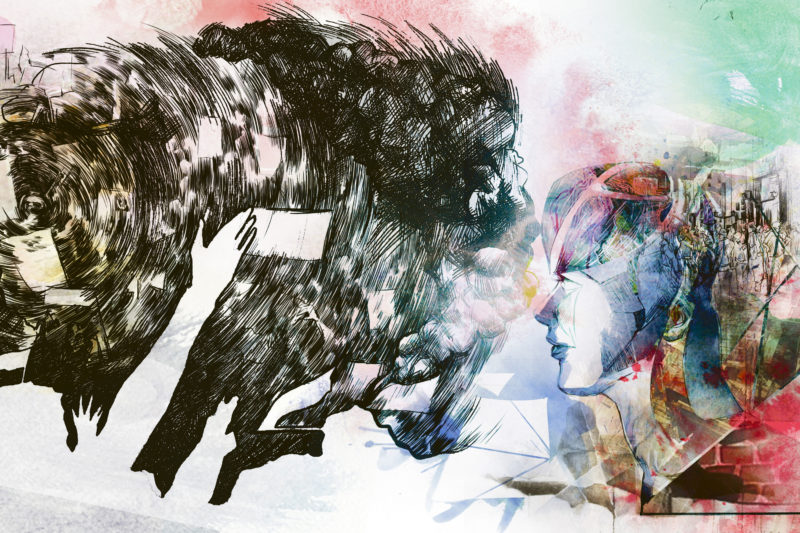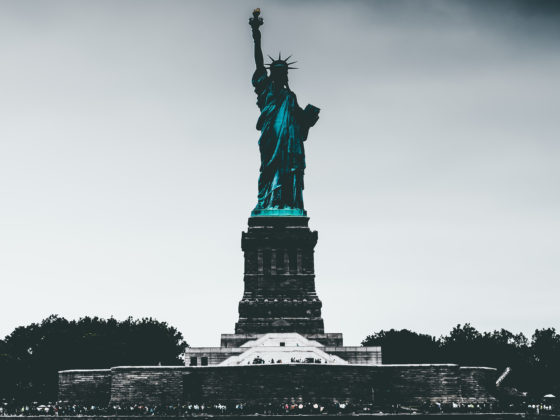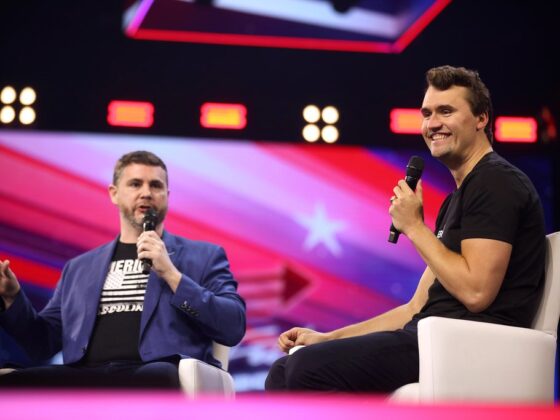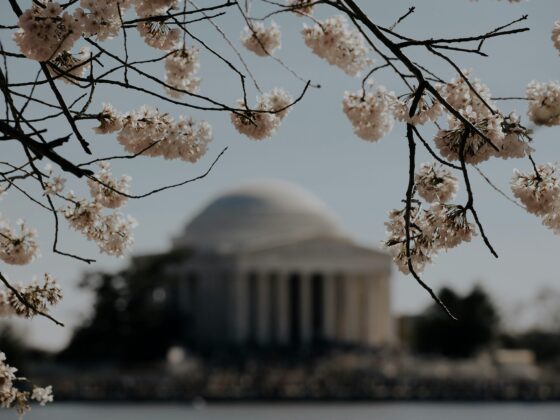I’ve been a queer activist since I was 17. I grew up in a socially conservative rural town where people would shout homophobic slurs at me from the windows of their pickup trucks. My brushes with anti-gay hatred intimidated me, but they also lit a fire in me. In my last year of high school, I resolved to do whatever I could to make a change before I graduated and left town for good. I felt like I had a duty to help other queer kids who were too scared to come out or who had feelings of self-hatred. I gave an impassioned speech about tolerance at a school assembly, flyered every hallway and classroom, and started a group for LGBTQ students and allies.
Not long after, I was exposed to the ideas of Judith Butler, a bold and penetrating mix of third-wave feminism and queer theory. I saw truth in Butler’s radical perspective on gender, and it felt liberating. My lifelong discomfort with being put in a box — a binary gender category — was vindicated. This is when my passion for feminism began in earnest. I put a bumper sticker on my car that said “Well-Behaved Women Rarely Make History.” I bought a subscription to Bitch magazine. When it came time to graduate and move on to McGill, I eagerly enrolled in a class on feminist theory, as well as a class in Sexual Diversity Studies, the subject that would later become my minor.
My world only kept expanding from there. In Montreal, I was exposed to a greater diversity of people and perspectives than ever before. The same sort of transformation that had occurred in my mind about gender happened with race and disability. I learned about classism and capitalism. At Rad Frosh, a workshop by the high-profile activist Jaggi Singh gave me my first real introduction to anarchism. My first year at McGill was a whirlwind of new people and new revelations.
In my second year, I dove in. I became heavily involved with a variety of queer, feminist, generally anti-oppressive, and radical leftist groups and organizations, in every combination thereof (Mob Squad is one example of many). I read books like Why Are Faggots So Afraid of Faggots? and The Coming Insurrection. I shouted my lungs out at protests. So many protests. Marching down the street carrying a sign that said “Fuck Capitalism” became my main form of exercise. That was the year of the tuition protests. There was a lot of excitement in the air. I thought maybe, just maybe, there would be a revolution. A girl can dream.
2012 was the year I hit peak radicalism. Things I did that year included occupying a campus building (for the second time), bodychecking a security guard, getting rammed at low speed by a cop on a moped, sitting through an entire SSMU General Assembly, and running from flashbang grenades hurled by police. (I wasn’t nearly as hardcore as most of the people I knew. “I love how pepper spray clears out your sinuses,” one said. Some participated in black blocs. At one point, a few spent the night in jail.)
Since then, my political worldview has steadily grown and evolved and refined itself. I no longer pine for revolution. I don’t hate capitalism or the state as if those were the names of the people who killed my dog. My politics still lean to the left, just not quite so far, and now I view economic and political systems with an engineer’s eye, rather than in the stark colours of moral outrage. I am just as passionate about queer activism and feminism as I ever was, and aspire to be an ally to other anti-oppressive movements just as much as I ever did. I feel like I have a richer and more nuanced understanding of anti-oppressive politics and ethics than ever before. I’ve held onto all the lessons that I’ve learned. I am grateful to the many people who shared their insight with me.
I’ll be graduating soon, and I’ve been thinking about my years in Montreal with both nostalgia and regret. Something has been nagging at me for a long time. There’s something I need to say out loud, to everyone before I leave. It’s something that I’ve wanted to say for a long time, but I’ve struggled to find the right words. I need to tell people what was wrong with the activism I was engaged in, and why I bailed out. I have many fond memories from that time, but all in all, it was the darkest chapter of my life.
I used to endorse a particular brand of politics that is prevalent at McGill and in Montreal more widely. It is a fusion of a certain kind of anti-oppressive politics and a certain kind of radical leftist politics. This particular brand of politics begins with good intentions and noble causes, but metastasizes into a nightmare. In general, the activists involved are the nicest, most conscientious people you could hope to know. But at some point, they took a wrong turn, and their devotion to social justice led them down a dark path. Having been on both sides of the glass, I think I can bring some painful but necessary truth to light.
Important disclaimer: I passionately support anti-oppressive politics in general and have only good things to say about it. My current political worldview falls under the umbrella of leftism, although not radical leftism. I’m basically a social democrat who likes co-ops and believes in universal basic income, the so-called ‘capitalist road to communism.’ I agree with a lot of what the radical left has to say, but I disagree with a lot of what it has to say. I’m deeply against Marxism-Leninism and social anarchism, but I’m sympathetic to market socialism and direct democracy. I don’t have any criticism for radical leftism in general, at least not here, not today. What I feel compelled to criticize is only one very specific political phenomenon, one particular incarnation of radical leftist, anti-oppressive politics.
There is something dark and vaguely cultish about this particular brand of politics. I’ve thought a lot about what exactly that is. I’ve pinned down four core features that make it so disturbing: dogmatism, groupthink, a crusader mentality, and anti-intellectualism. I’ll go into detail about each one of these. The following is as much a confession as it is an admonishment. I will not mention a single sin that I have not been fully and damnably guilty of in my time.
First, dogmatism. One way to define the difference between a regular belief and a sacred belief is that people who hold sacred beliefs think it is morally wrong for anyone to question those beliefs. If someone does question those beliefs, they’re not just being stupid or even depraved, they’re actively doing violence. They might as well be kicking a puppy. When people hold sacred beliefs, there is no disagreement without animosity. In this mindset, people who disagreed with my views weren’t just wrong, they were awful people. I watched what people said closely, scanning for objectionable content. Any infraction reflected badly on your character, and too many might put you on my blacklist. Calling them ‘sacred beliefs’ is a nice way to put it. What I mean to say is that they are dogmas.
Thinking this way quickly divides the world into an ingroup and an outgroup — believers and heathens, the righteous and the wrong-teous. “I hate being around un-rad people,” a friend once texted me, infuriated with their liberal roommates. Members of the ingroup are held to the same stringent standards. Every minor heresy inches you further away from the group. People are reluctant to say that anything is too radical for fear of being been seen as too un-radical. Conversely, showing your devotion to the cause earns you respect. Groupthink becomes the modus operandi. When I was part of groups like this, everyone was on exactly the same page about a suspiciously large range of issues. Internal disagreement was rare. The insular community served as an incubator of extreme, irrational views.
High on their own supply, activists in these organizing circles end up developing a crusader mentality: an extreme self-righteousness based on the conviction that they are doing the secular equivalent of God’s work. It isn’t about ego or elevating oneself. In fact, the activists I knew and I tended to denigrate ourselves more than anything. It wasn’t about us, it was about the desperately needed work we were doing, it was about the people we were trying to help. The danger of the crusader mentality is that it turns the world in a battle between good and evil. Actions that would otherwise seem extreme and crazy become natural and expected. I didn’t think twice about doing a lot of things I would never do today.
There is a lot to admire about the activists I befriended. They have only the best intentions. They are selfless and dedicated to doing what they think is right, even at great personal sacrifice. Sadly, in this case their conscience has betrayed them. My conscience betrayed me. It was only when I finally gave myself permission to be selfish, after months and months of grinding on despite being horribly burnt out, that I eventually achieved the critical distance to rethink my political beliefs.
Anti-intellectualism is a pill I swallowed, but it got caught in my throat, and that would eventually save me. It comes in a few forms. Activists in these circles often express disdain for theory because they take theoretical issues to be idle sudoku puzzles far removed from the real issues on the ground. This is what led one friend of mine to say, in anger and disbelief, “People’s lives aren’t some theoretical issue!” That same person also declared allegiance to a large number of theories about people’s lives, which reveals something important. Almost everything we do depends on one theoretical belief or another, which range from simple to complex and from implicit to explicit. A theoretical issue is just a general or fundamental question about something that we find important enough to think about. Theoretical issues include ethical issues, issues of political philosophy, and issues about the ontological status of gender, race, and disability. Ultimately, it’s hard to draw a clear line between theorizing and thinking in general. Disdain for thinking is ludicrous, and no one would ever express it if they knew that’s what they were doing.
Specifically on the radical leftist side of things, one problem created by this anti-theoretical bent is a lot of rhetoric and bluster, a lot of passionate railing against the world or some aspect of it, without a clear, detailed, concrete alternative. There was a common excuse for this. As an activist friend wrote in an email, “The present organization of society fatally impairs our ability to imagine meaningful alternatives. As such, constructive proposals will simply end up reproducing present relations.” This claim is couched in theoretical language, but it is a rationale for not theorizing about political alternatives. For a long time I accepted this rationale. Then I realized that mere opposition to the status quo wasn’t enough to distinguish us from nihilists. In the software industry, a hyped-up piece of software that never actually gets released is called “vapourware.” We should be wary of political vapourware. If somebody’s alternative to the status quo is nothing, or at least nothing very specific, then what are they even talking about? They are hawking political vapourware, giving a “sales pitch” for something that doesn’t even exist.
Anti-intellectualism also comes out in full force on the anti-oppressive side of things. It manifests itself in the view that knowledge not just about what oppression, is like, but also knowledge about all the ethical questions pertaining to oppression is accessible only through personal experience. The answers to these ethical questions are treated as a matter of private revelation. In the academic field of ethics, ethical claims are judged on the strength of their arguments, a form of public revelation. Some activists find this approach intolerable.
Perhaps the most deeply held tenet of a certain version of anti-oppressive politics – which is by no means the only version – is that members of an oppressed group are infallible in what they say about the oppression faced by that group. This tenet stems from the wise rule of thumb that marginalized groups must be allowed to speak for themselves. But it takes that rule of thumb to an unwieldy extreme.
Let me give an example. A gay person is typically much better acquainted with homophobia than a straight person. Moreover, a gay person has a much greater stake in what society does about homophobia, so their view on the matter is more important. However, there is nothing about the experience of being gay in itself that enlightens a gay person about the ethics of sexual orientation.
To take a dead simple case, you don’t have to hear it from a gay person to know that homosexuality is ethically just fine. If you’re a straight person and a gay person tells you that homosexuality is wrong, you can be confident in your judgement that they are full of shit. In this situation, the straight person is right and the gay person is wrong about homosexuality and homophobia. Gay people have no special access to ethical knowledge, in general or about sexual orientation specifically. Gay people do tend to have better ethical knowledge about sexual orientation than straight people, but that is only because of how our life circumstances move us to reflect on it.
If I said the same thing about another context that isn’t so simple — when the correct opinion isn’t so obvious — I would be roundly condemned. But the example’s simplicity isn’t what makes it valid. People who belong to oppressed groups are just people, with thoughts ultimately as fallible as anyone else’s. They aren’t oracles who dispense eternal wisdom. Ironically, this principle of infallibility, designed to combat oppression, has allowed essentialism to creep in. The trait that defines a person’s group membership is treated as a source of innate ethical knowledge. This is to say nothing about the broader problem of how you’re supposed to decide who’s a source of innate knowledge. Certainly not someone who innately “knows” that homosexuality is disgusting and wrong, but why not, if you’re simply relying on private revelation rather than public criteria?
Consider otherkin, people who believe they are literally animals or magical creatures and who use the concepts and language of anti-oppressive politics to talk about themselves. I have no problem drawing my own conclusions about the lived experience of otherkin. Nobody is literally a honeybee or a dragon. We have to assess claims about oppression based on more than just what people say about themselves. If I took the idea of the infallibility of the oppressed seriously, I would have to trust that dragons exist. That is why it’s such an unreliable guide. (I half-expect the response, “Check your human privilege!”)
It is an ominous sign whenever a political movement dispenses with methods and approaches of gaining knowledge that are anchored to public revelation and, moreover, becomes openly hostile to them. Anti-intellectualism and a corresponding reliance on innate knowledge is one of the hallmarks of a cult or a totalitarian ideology.
Anti-intellectualism was the one facet of this worldview I could never fully stomach. I was dogmatic, I fell prey to groupthink, and I had a crusader mentality, but I was never completely anti-intellectual. Ever since I was a child, the pursuit of knowledge has felt like my calling. It’s part of who I am. I could never turn my back on it. At least not completely. And that was the crack through which the light came in. My love for deep reflection and systematic thinking never ceased. Almost by accident, I took time off from being an activist. I spent time just trying to be happy and at peace, far away from Montreal. It had been a long while since I had the time and the freedom to just think. At first, I pulled on a few threads, and then with that eventually the whole thing unravelled. Slowly, my political worldview collapsed in on itself.
The aftermath was wonderful. A world that seemed grey and hopeless filled with colour. I can’t convey to you how bleak my worldview was. An activist friend once said to me, with complete sincerity, “Everything is problematic.” That was the general consensus. Far bleaker was something I said during a phone call to an old friend who lived in another city, far outside my political world. I, like a disproportionate number of radical leftists, was depressed, and spent a lot of time sighing into the receiver. “I’m not worried about you killing yourself,” he said. “I know you want to live forever.” I let out a weak, sad laugh. “When I said that,” I replied, “I was a lot happier than I am now.” Losing my political ideology was extremely liberating. I became a happier person. I also believe that I became a better person.
I’ve just said a lot of negative things. But, of course, my goal here is to do something positive. I’m cursing the darkness in the hope of seeing the light of a new day. Still, I don’t want to just criticize without offering an alternative. So, let me give a few pieces of constructive advice to anyone interested in anti-oppressive and/or leftist activism.
First, embrace humility. You may find it refreshing. Others will find it refreshing too. Be forceful, be impassioned, just don’t get too high on your own supply. Don’t drink your own kool aid. Question yourself as fiercely as you question society.
Second, treat people as individuals. For instance, don’t treat every person who belongs to an oppressed group as an authoritative mouthpiece of that group as a whole. People aren’t plugged into some kind of hive mind. Treating them like they are, besides being essentialist, also leads to contradictions since, obviously, not all people agree on all things. There is no shortcut that allows you to avoid thinking for yourself about oppression simply by deferring to the judgements of others. You have to decide whose judgements you are going to trust, and that comes to the same thing as judging for yourself. This drops a huge responsibility on your lap. Grasp the nettle firmly. Accept the responsibility and hone your thinking. Notice contradictions and logical fallacies. When you hear an opinion about a kind of oppression from a member of the group that experiences it, seek out countervailing opinions from members of the same group and weigh them against each other. Don’t be afraid to have original insights.
Third, learn to be diplomatic. Not everything is a war of good versus evil. Reasonable, informed, conscientious people often disagree about important ethical issues. People are going to have different conceptions of what being anti-oppressive entails, so get used to disagreement. When it comes to moral disagreements, disbelief, anger, and a sense of urgency are to be expected. They are inherent parts of moral disagreement. That’s what makes a diplomatic touch so necessary. Otherwise, everything turns into a shouting match.
Fourth, take a systems approach to the political spectrum. Treat the pursuit of the best kind of society as an engineering problem. Think about specific, concrete proposals. Would they actually work? Deconflate desirability and feasibility. Refine your categories beyond simple dichotomies like capitalism/socialism or statism/anarchism.
I am not going to let my disillusionment with my past activism discourage me from trying to do good in the future. If you find yourself similarly disillusioned, take heart. As long as you learn from your mistakes, no one can blame you for trying to be a good person. Don’t worry. We all get to come back.
This article was originally published at The McGill Daily.













21 comments
I’m tired of these types of articles. They are written by communists apologizing for being communists and although they recognize communism has its flaws they still believe communism can work if only communism wasn’t so brutal but hey our intentions as communists are good so forgive us and embrace communism anyway. I’m gay like the author btw and I realized their bullshit 35 years ago when I was still in high school but hey I’m a white racist capitalist American.
The way you take a systems-engineering approach to public policy is basically to ask a few questions that are rarely asked.
What behavior is rewarded?
What incentives are created?
What barriers are created or eliminated?
What will it cost?
For example, if your constituents complain that gasoline is too expensive and you pass a law requiring gasoline to be sold at 50 cents/gallon retail, you will instantly create a gasoline shortage. Nobody will make gasoline for your jurisdiction, or try to sell it to your retailers.
And when you’re messing with how people socialize, it’s important to make sure you know what social structures you are weakening, what purpose they serve, and what will serve that purpose going forward. For example, strong natural marriage (i.e., between a man and a woman with low barriers to entry and high legal barriers to leaving) has had the effect that fathers are far more likely to support and participate in the rearing and education of their children. Welfare, alimony, and child support have utterly failed to reproduce the effects of fathers participating in fatherhood in limiting all sorts of negative outcomes.
I appreciate this post. I’m glad the author has found more happiness and I wish her ever more.
The author and I probably disagree on just about every political issue but there’s always common ground to be found and I certainly agree with much of her points about activism. I see a lot of ideologues from either end of the spectrum that use their boxed-in view-point to justify all sorts of animosity and anger towards others. It’s a dirty game and no one benefits.
One particular point that resonates with me is the need to treat everyone as individuals. To me, this is where it all starts. Society’s problems are individual problems and will truly only be solved as individuals strive to overcome the challenges they face (and we all face challenges, whether externally inflicted or self-inflicted). Strong individuals build strong family units which build strong communities which build strong societies, but not necessarily the other way around. It’s a multi-layered issue; but boiled down, we simply won’t fix our society by addressing them at the societal level. Not to mention that slotting everyone into groups, whether by race, sexuality, class or whatever is the foundation for all racism, bigotry, classism, etc.
One question, how long does it take to finish a degree at McGill? The author states that peak radicalisation happened in 2012 & yet they’ll be “graduating soon”. What have they been doing for the last 8 years? Any hope of a job at the end of all this shouting?
I take it that getting a job and working for a living isn’t “radical” enough & the author hated capitalism (how very bourgeois to earn wages) but the vast majority of us just haven’t got the option to do otherwise.
I see the original article was published in 2014…. a lot of water under the bridge since then.
Perhaps you could put this fact (date of publication) in the footnote?
Good idea on highlighting this. That jumped out to me as well.
Thank you for pointing this out.
This site contains a wealth of valuable information, but is in sore need of professional editing.
to the Author: I like this approach and think you could do good speaking to people fully indoctrinated into the woke cult. It’s good to use the rhetoric they use. That said, this piece could be shortened quite a bit or broken into separate pieces.
What is “market socialism”?
This means that if you have worked very hard, your kapo will provide you a reinforced camp’s meal.
I assumed that refers to Scandinavian-style market economies with heavy social programs
I guess, the term describes a political economic system like that of post- Workd War II Germany. The country embraced liberal democracy and decided -like most Western democracies at that time- to have a market economy, which created private wealth and economic growth but at the same time kept the negatives of an unfettered capitalism in check. This was achieved by progressive taxes, regulations and a social welfare program such as mandatory unemployment insurance, universal health care, organized labour, labour rights, and so forth. Germans called this a “social market economy” or “soziale Marktwirtschaft”.
Really enjoyed and benefitted from reading this. Honest and insightful. Touched many a cord with me. Left politics badly needs to lose CSJ; being against CSJ is not the perogative of the right wing; opening up and being self reflective is badly needed within the radical left.
For a website that exhorts its readers to reject the narrative of ‘Lived Experiences’ and ‘Anti-Racism’ (framed here as Anti-Oppression), this article’s content seems…awkward.
Though there are many issues begging to be addressed here, I’ll only tackle one – the idea of taking an engineer’s approach to society, while treating everyone as an individual. No matter how much literature you study in leftist economic and political theory, it all ends with various ways the individual must be rejected.
An “engineering approach” to political systems requires a rejection of the individual, since human beings are complex with diverse motivations, needs, and desires, none of which fit neatly into a formulaic or systematic approach. You might be able to develop a system for one person, but the moment you plug another into it, the system fails. History – within living memory – can produce innumerable mass graves in societies that took an engineer’s approach.
Moral or ethical systems probably govern societies most effectively, but only when the association is voluntary. I am hard pressed to think of any Leftist philosophy which does not ultimately reject individual freedom of association, or even the existence of competing moral systems…particularly that of ‘anti-oppression’ politics. Indeed it becomes intellectually confounding to consider the rejection of objective morality philosophically ingrained among the Left, who then pronounce their own moral righteousness without irony.
Filled with inconsistencies, confusion, revelation, and confidence, it never gets old reading the evolution of a young mind. Kudos to the author for such productive introspection. A broader education would likely have done the author’s mind a lot more justice.
gmmayo70-I like your observation that an engineering approach to humans is hostile to individuality. There is only one correct answer to a math question. Engineering is based on math/physics. Great insight.
“I put a bumper sticker on my car that said “Well-Behaved Women Rarely Make History.””
I always wanted to make a version of this bumper sticker with pictures of people like Napoleon and bin Laden. The implication being that, it’s badly-behaved men who make history – so the original bumper-sticker is correct.
While not personally religious, I’ve found the words of the Serenity prayer to be the key to a happy life. “God, grant me the serenity to accept the things I cannot change, courage to change the things I can, and wisdom to know the difference.” Those who go around railing against realities they can’t change inevitably end up disillusioned and hopeless. It sounds like this author is well on her way toward embracing those concepts and their improved mental wellbeing is a sign of it.
You could have made the essay shorter.
Also, how do you define “direct democracy” and “market socialism”? Let’s be sure we all have the same understanding of them. How do you define “good person”? That’s a subjective phrase. I suggest using more behavior based terms.
On another note, I see how you are working to balance former zeal with a more humble approach. Also, it is always helpful to hear and associate with people who have opposite opinions on any issue. This prevents the lead-lined room syndrome where people think everyone else thinks like they do.
By the way, kids, high school kids, and a few years older could care less if somebody is(gay or whatever. They generally do not care. It seems to be older people who are LGBTQIA obsessed.
Hear hear, on a shorter essay – advice most of the articles here could incorporate, as this site could desperately use a content editor.
Agreed on the definitions of terms, although I would add a few more to the list. “Homophobia” for one, as psychologists seem to have broadened the scope of the word beyond “irrational fear of homosexuals” to ‘dislike’, and the activists’ even further expansion to “anything critical of homosexuals” (or, more accurately, homosexual activism).
The entire “Important Disclaimer” paragraph was as unnecessary as it was confused. In fact, the whole six or seven paragraph introduction of ideological street cred was enough to get me skimming – something I normally don’t do.
Cal,
Not exactly. You view “older people” as being LGBTQIA obsessed. I am 64 years old, the best man (gay) and maid of honor (lesbian) at my wedding in 1978 on Virginia Beach, witnesses to two “straights”. vows. Let me just say, many of us “boomers” grew up more acceptable of others than the new “enlightened” generation will ever be. I was eleven in 1968 as I watched, Not on t.v., but live from my Aunt’s house near television hill in Baltimore, burn. That made me even more intent on working toward being more understanding and acceptable of the lives, passions and desires of my peers – regardless of race, religion or station in life. Why did I write “more intent”? Because I grew up in rural Western Maryland in an area that the public schools were integrated before integration was a term in public discourse. Cal, “older people”, even conservatives are more acceptable of individual choice than many progressive/liberals. We walked through these same fires before and we know the this Nation will survive this trial. It may be different, but, it will respect the individual and maintain the freedoms the Constitution has outlined from our formance as a nation. People of intelligence will always come to understand – independence will alway succeed over the dominance of government oppression.
Thanks G.V. I’ve been pleasantly surprised by how many people on the right care about individuality. A real breath of fresh air. While I’ve never been a hardcore activist — I’ve experienced similar emotional benefits from no longer being sympathetic to leftist views. I don’t really see much conversation between liberals that I agree with so have difficulty classifying my politics. Of course I live in a mostly leftist region which is why I rarely come across conservatives but for years I’ve relished when any people complained about democrats.